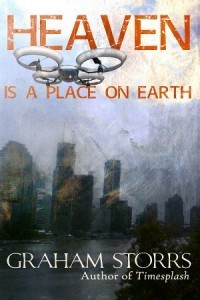Writing process blog hop
Meryl tagged me for this blog hop and I can refuse her nothing.
The rules are: Answer the four questions below, link back to the person who invited you, and name the people who will be posting the following Monday.
I’m writing a novel about the Fermi Paradox - its working title is Metaman. I think any sci-fi writer who thinks about what they’re doing has to have some kind of answer to the Fermi Paradox. I’m not saying Metaman will be mine, but it will be an answer. Even if people don’t like my solution, I get to write a book that is set mostly in space and, after so many near-future books set on Earth, this is big fun. If you are lucky enough to have missed my Twitter and Facebook barrage of the last couple of days, you won’t know that I’m releasing a new novel tomorrow. It’s a sci-fi comedy called Cargo Cult and this too is big fun. However, launches are never fun for me, so the rest of this week (and beyond) will see my writing productivity way down while my staring obsessively at the Amazon charts productivity goes way up.
How does my work differ from others of its genre?
This depends on what you think my genre is! I write science fiction (so no fantasy elements ever - why?). Within that genre, I write mostly thrillers and (as of tomorrow) comedy. There is an awful lot of science fiction on the shelves that I wouldn’t even consider as belonging to the genre. Even when it is “hard” enough to suit my taste, a lot of it is very silly. Literary types who snobbishly think the genre is all about shallow adventure stories set in space are not all wrong (although, look at who’s calling the pot black!). However, there is a core of science fiction that has in it some of the best and most intelligent literature ever written. It is absolutely a “literature of ideas” and it is a literature whose philosophical underpinnings I entirely endorse. It is this wonderful core of the genre that I admire and aspire to, and I certainly hope this is apparent in the books and stories I write.
Why do I write what I write?
I like to think that, in the tradition of all good sci-fi, I build my worlds and my characters very carefully and use them to explore the ideas that fascinate me. I take ideas very seriously. I see ideas as beautiful puzzles that it is a delight to work on, I love it that evidence needs to be found and weighed, and consequences and corollaries need to be hunted down and explored. Science fiction is such a wonderful medium in which to do all this – and all in the context of a thumping good story with great characters. It’s why I read it and why I write it. My last novel, Heaven is a Place on Earth, while cleverly disguised as an exciting thriller, was all about exploring the possibilities for  deception and fraud that augmented reality will bring to human society. I loved creating it and I hope people will appreciate the thought that went into it.
deception and fraud that augmented reality will bring to human society. I loved creating it and I hope people will appreciate the thought that went into it.
Of course, I sometimes write just for fun. Pick up Cargo Cult tomorrow and you will see what I mean. Even then, there is a very proud tradition of excellence in humorous writing within science fiction. (Need I mention Harry Harrison, Douglas Adams, or Doug Naylor?)
How does your writing process work?
I start at the beginning. I write to the end. Then I stop.
Ha! The reality is, I have an idea – usually twenty ideas at once – and I gestate it for weeks, months, or a lifetime. I sometimes find I have something which might work as a novel. So I start jotting things down – little fragments of plot, character descriptions, themes, and ideas. Eventually, I think I can see my way from some kind of beginning to some kind of end and I try to write down the whole plot – nothing too strenuous, just a single sheet of paper. If it still looks OK, I start writing. I can usually tell from the first paragraph if I’m on to a winner. If I am, I keep on writing and writing. Somewhere around 20,000 words into it, I will either get bogged down or I’ll feel the wind under my wings (I like to wear wings while I’m writing). If I get bogged down, I’ll persist for a while – sometimes months – in trying to move past it but, depressingly often, I set it aside at that point and work on something else. Maybe in a year or two I’ll come back to it – or maybe I won’t. If I carry on to the end, I will usually have one or two hiccoughs – needing to backtrack, throw stuff away, and set things back on course because they’ve gone astray, needing to go back and rewrite something so I can take a new course, things like that – but I eventually get there.
I write very slowly and carefully and make revisions as I go along – there’s also all that gestation and preparation – so my first drafts are usually pretty good. When I say slowly, I mean I am very pleased if I can average 500 words a day. Despite the excellence of my first draft, I send the manuscript to beta readers and, when the copious comments are back, I do a revision to accommodate them. I’ll probably read through it and edit it four or five times more before I have a final draft. That’s the one that goes to a publisher or, more likely these days, the one that goes to an editor and is then self-published.
Then, with a loud hurrah, I start on the next one.
The blog hop stops here:
These things are evil. I won’t be tagging anyone with this. Mostly, I find these things a burden and would not want to pass one on to a friend. Unusually, this one caught my fancy and I enjoyed doing it. If you’re desperate to see how other writers answer these four questions, I suggest you google the question text and see whose name turns up. As for me, I’m deep into a scene in which My Hero is having cybersex in Mars orbit. So, if you’ll excuse me…




